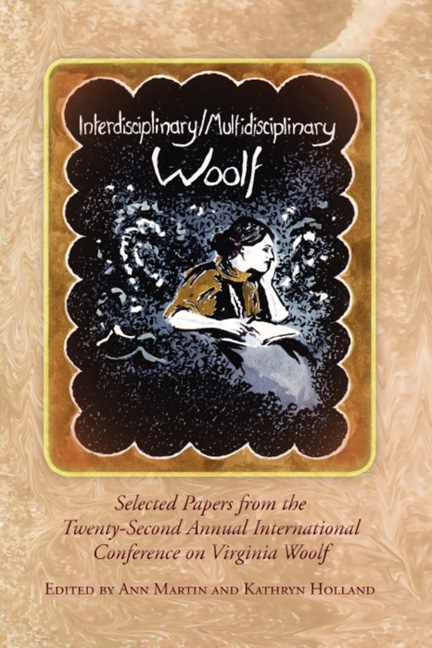Book contents
- Frontmatter
- Contents
- Introduction to Interdisciplinary/Multidisciplinary Woolf
- Acknowledgments
- List of Abbreviations
- History, Materiality, Multiplicity
- Patterns, Practices, Principles
- “Waving to Virginia”
- Woolf, Defoe, Derrida: Interdisciplinary dogs—or the canine aesthetics and (gender) politics of creativity
- “The law is on the side of the normal”: Virginia Woolf as Crip Theorist
- A Healing Centre of One's Own: Woolf's Legacy and Public Responses to Child Abuse
- Sunflower Suture: Disseminating the Garden in The Years
- “One Must Be Scientific”: Natural History and Ecology in Mrs. Dalloway
- Clarissa's Glacial Skepticism: John Tyndall and “Deep Time” in Mrs. Dalloway
- Apollonian Illusion and Dionysian Truth in Mrs. Dalloway
- Art, Influence, Embodiment
- Publishing, Politics, Publics
- Notes on Contributors
- Conference Program
Clarissa's Glacial Skepticism: John Tyndall and “Deep Time” in Mrs. Dalloway
from Patterns, Practices, Principles
- Frontmatter
- Contents
- Introduction to Interdisciplinary/Multidisciplinary Woolf
- Acknowledgments
- List of Abbreviations
- History, Materiality, Multiplicity
- Patterns, Practices, Principles
- “Waving to Virginia”
- Woolf, Defoe, Derrida: Interdisciplinary dogs—or the canine aesthetics and (gender) politics of creativity
- “The law is on the side of the normal”: Virginia Woolf as Crip Theorist
- A Healing Centre of One's Own: Woolf's Legacy and Public Responses to Child Abuse
- Sunflower Suture: Disseminating the Garden in The Years
- “One Must Be Scientific”: Natural History and Ecology in Mrs. Dalloway
- Clarissa's Glacial Skepticism: John Tyndall and “Deep Time” in Mrs. Dalloway
- Apollonian Illusion and Dionysian Truth in Mrs. Dalloway
- Art, Influence, Embodiment
- Publishing, Politics, Publics
- Notes on Contributors
- Conference Program
Summary
When Peter Walsh leaves Regent's Park, anguished anew about Clarissa's rejection so many years in the past, his thought—“Clarissa was as cold as an icicle”— is met almost immediately with the apparition of an old woman (80). Whether we hear the beggar woman's song in Mrs. Dalloway as the voice of the economically dispossessed or, more romantically, see her as a prehistoric goddess figure, there is no doubt that she, or rather her voice, is associated metaphorically with water and earth, an “ancient spring” and chthonic song bubbling up from “a mere hole in the Earth” (81). Like a melting glacier, the old woman's voice transforms Clarissa's icicle coldness, abruptly shifting the temporal scheme of “The Hours” from the human and the immediate—this day in London, these human lives—to the geologic and the vast, where “millions of years” have passed since she walked with her lover in “some primeval May” (82). As Gillian Beer, Bonnie Scott, and others have noted, this sudden telescoping from the historic to the prehistoric is Victorian in its intense preoccupation with the Earth before humanity and characteristic of Woolf's interest in the science of Darwin. As much as evolutionary theory, however, nineteenth-century advancements in glaciology and geology also radically shook the Victorians’ sense of the age of the Earth and humans’ place on it. The Victorians, in Robert MacFarlane's terms, “had to come to terms with the concept that humanity lived in an epoch bracketed by ages of ice” (121). In Mrs. Dalloway, the old woman's song gestures towards this icy pre- and post-history of humans on the planet, both the “hoar and silver frost” on the flowers of that ancient May day and the unknown future, “when the pageant of the universe would be over” and the Earth “become a mere cinder of ice.” As fluid, damp, and primordial as the old woman's Earth song may seem, it is bounded at its far reaches by ice.
If “to walk…a glacier is to walk backwards in time” (MacFarlane 132), then Peter's sudden vision of the Earth's origins fractures Mrs. Dalloway's time signatures into the human and the geologic.
- Type
- Chapter
- Information
- Interdisciplinary/Multidisciplinary Woolf , pp. 132 - 137Publisher: Liverpool University PressPrint publication year: 2013



